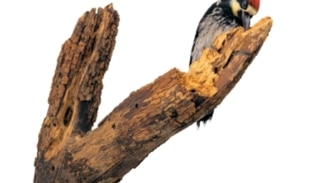
啄木传信
Woodpecker Head Bangs Communicate Info
啄木传信
Woodpeckers that listen to others of their kind drum into trees alter their behavior based on what they hear.
啄木鸟通过听取同类啄木的声音来调整他们的行为。
播音/撰文
翻译 Meatle
审校 丁可含
[Pretty bird song]
【悦耳鸟声】
Some birds produce beautiful songs.
一些鸟儿的叫声悦耳动听。
[Woodpecker drumming]
【啄木鸟在“击鼓”】
Woodpeckers are not among them. The most familiar sound they make is when they tap on tree trunks with their bills to produce what’s called “drumming."
啄木鸟看来并不合群。啄木鸟最常见的“叫声”是当它们的喙敲击树干时所发出的声音,也就是所谓“击鼓声”。
"This drumming that they show is essentially them kind of slamming their head against a tree at remarkable speeds.” Wake Forest University biologist Matthew Fuxjager.
“这些击鼓声是啄木鸟的头高速敲击树干造成的。”维克森林大学(Wake Forest University)的生物学家马修·福克西格(Matthew Fuxjager)说道。
“Some of the woodpeckers will use this kind of drumming-type maneuvering to excavate a nest, they'll make little caches in a tree to store food, or some of them will actually forage that way. But then they also use it for this social signal."
“一些啄木鸟会通过这种击鼓行为来挖出自己的巢穴,它们会用这种方式在树上制作储存食物的隐秘所,或直接使用这种方式觅食。但是,它们也会用击鼓的方式来传播社交信号。”
Fuxjager’s team broadcast the pre-recorded sounds of head slams to mated pairs of downy woodpeckers in the woods nearby. They discovered that there's a lot of information communicated in the drumming.
福克西格的团队在附近的森林中给一对绒啄木鸟(downy woodpeckers)夫妻播放预先录制的啄木声。他们发现了这些击鼓声中含有大量的通信信息。
For example, woodpeckers that produce shorter drums are probably kind of wimpy, and easy to beat in a fight. But if a drum is longer, the challenger might be advertising itself as a stronger, tougher bird, one that's a bit harder to fend off.
比如,发出短促啄木声的啄木鸟可能比较弱小,容易被击败。但如果啄木声更长,发出这样的声音的挑战者可能是在宣扬自己更为强壮,更难被阻挡。
And after hearing recordings of long drums, pairs of birds begin to coordinate the defense of their territory. They don’t bother with such behavior after short drums. [Eric R. Schuppe, Gloria D. Sanin and Matthew J. Fuxjager, The social context of a territorial dispute differentially influences the way individuals in breeding pairs coordinate their aggressive tactics, inBehavioral Ecology and Sociobiology]
当这双啄木鸟听到长“鼓声”后,它们开始调整领地的防御。而在听到短“鼓声”后,它们没有进行相似的行动。
The researchers think that this kind of coordination might have evolved because woodpeckers invest so much time and energy carving out their nest hole in a tree. If they were kicked out and had to start over, they might not get a chance to reproduce and fledge their offspring. By responding only to more realistic threats, woodpecker pairs can conserve energy to be expended at the hard work of raising their headstrong chicks.
研究人员认为这种调整行为是演化而成的,因为啄木鸟花费大量的时间于精力来在树上挖出它们的巢穴。如果它们从巢穴中被赶出来,它们必须重新构建巢穴,从而降低了它们繁殖与养育后代的成功率。通过响应更为实在的威胁,啄木鸟夫妇能够为哺育子女保留更多的精力。
未经书面许可任何人不得复制或镜像
京ICP备11000850号-1
 京公网安备11010502039775号
京公网安备11010502039775号 信息网络传播视听节目许可证0111611号
国家科技基础条件平台

















